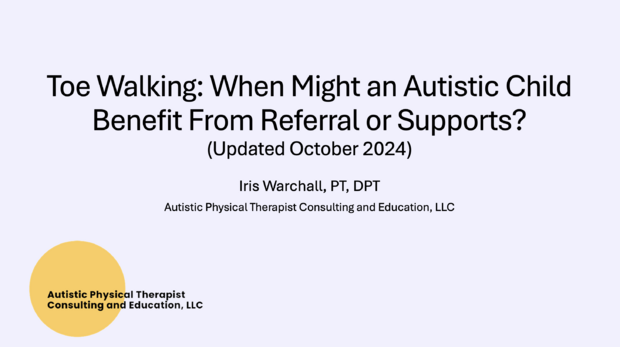Toe Walking: When Might An Autistic Child Benefit From Referral Or Supports?
On-demand webinar for healthcare professionals
Length: 27 minutes, closed captioning available
Course description:
When is it indicated for an autistic child who walks on their toes to be referred for support or further medical screening? While there are some autistic people who walk on their toes and experience pain or other problems, others do not experience problems in association with their toe-walking, and so professionals must use an individualized, person-centered approach to answering this question. This webinar for healthcare professionals summarizes research on toe-walking in autistic children, highlights the range of lived experiences autistic people can have with toe-walking, and provides guidance on how clinicians might take a neurodiversity-affirming approach to determining care recommendations.
Learning objectives:
- Upon completion of this course, clinicians will be able to:
- Describe the range of lived experiences autistic people can have associated with toe walking
- Summarize research evidence on effectiveness of various interventions for idiopathic toe walking
- List red flags indicating when a child who is walking on their toes should have medical workup to rule out other neurologic conditions
- Discuss a neurodiversity-affirming approach to determining whether a child who does not present with red flags should be referred for interventions for their toe walking
Speaker: Iris Warchall, PT, DPT
Iris Warchall (pronouns: she/they) is an autistic self-advocate, parent to an autistic child, and physical therapist specializing in supporting patients with a variety of the health conditions which are more prevalent among autistic people, including hypermobility spectrum conditions, pelvic health concerns, chronic pain, dizziness and vestibular dysfunction, and movement disorders.

